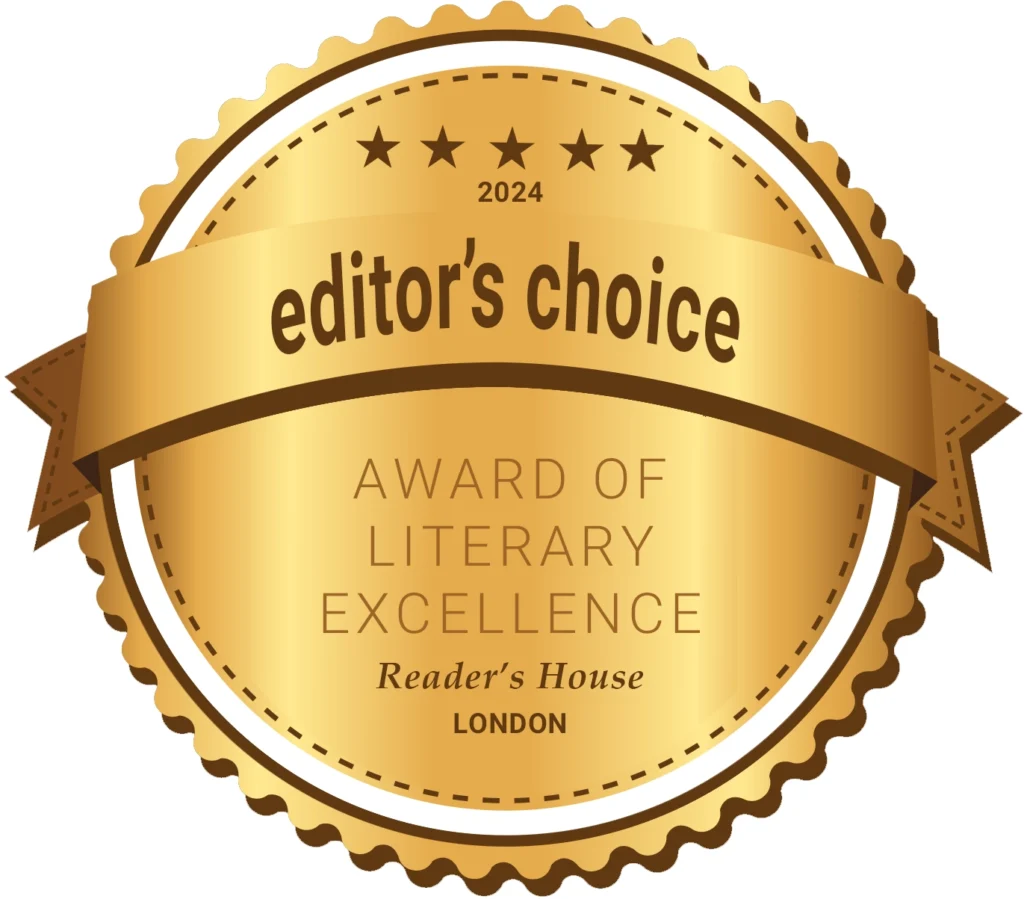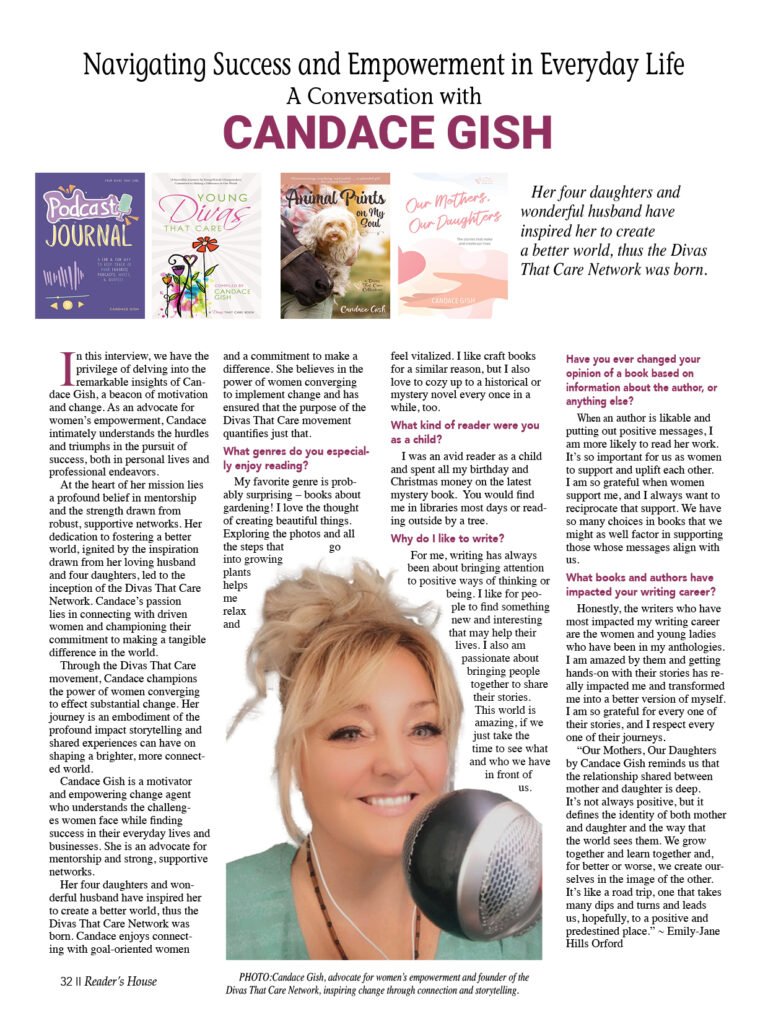A Conversation with Candace Gish

PHOTO: Candace Gish, advocate for women’s empowerment and founder of the Divas That Care Network, inspiring change through connection and storytelling.
In this interview, we have the privilege of delving into the remarkable insights of Candace Gish, a beacon of motivation and change. As an advocate for women’s empowerment, Candace intimately understands the hurdles and triumphs in the pursuit of success, both in personal lives and professional endeavors.
At the heart of her mission lies a profound belief in mentorship and the strength drawn from robust, supportive networks. Her dedication to fostering a better world, ignited by the inspiration drawn from her loving husband and four daughters, led to the inception of the Divas That Care Network. Candace’s passion lies in connecting with driven women and championing their commitment to making a tangible difference in the world.
Through the Divas That Care movement, Candace champions the power of women converging to effect substantial change. Her journey is an embodiment of the profound impact storytelling and shared experiences can have on shaping a brighter, more connected world.
Candace Gish is a motivator and empowering change agent who understands the challenges women face while finding success in their everyday lives and businesses. She is an advocate for mentorship and strong, supportive networks.
Her four daughters and wonderful husband have inspired her to create a better world, thus the Divas That Care Network was born. Candace enjoys connecting with goal-oriented women and a commitment to make a difference. She believes in the power of women converging to implement change and has ensured that the purpose of the Divas That Care movement quantifies just that.
What genres do you especially enjoy reading?
My favorite genre is probably surprising – books about gardening! I love the thought of creating beautiful things. Exploring the photos and all the steps that go into growing plants helps me relax and feel vitalized. I like craft books for a similar reason, but I also love to cozy up to a historical or mystery novel every once in a while, too.
What kind of reader were you as a child?
I was an avid reader as a child and spent all my birthday and Christmas money on the latest mystery book. You would find me in libraries most days or reading outside by a tree.
Why do I like to write?
For me, writing has always been about bringing attention to positive ways of thinking or being. I like for people to find something new and interesting that may help their lives. I also am passionate about bringing people together to share their stories. This world is amazing, if we just take the time to see what and who we have in front of us.
Have you ever changed your opinion of a book based on information about the author, or anything else?
When an author is likable and putting out positive messages, I am more likely to read her work. It’s so important for us as women to support and uplift each other. I am so grateful when women support me, and I always want to reciprocate that support. We have so many choices in books that we might as well factor in supporting those whose messages align with us.
What books and authors have impacted your writing career?
Honestly, the writers who have most impacted my writing career are the women and young ladies who have been in my anthologies. I am amazed by them and getting hands-on with their stories has really impacted me and transformed me into a better version of myself. I am so grateful for every one of their stories, and I respect every one of their journeys.
“Our Mothers, Our Daughters by Candace Gish reminds us that the relationship shared between mother and daughter is deep. It’s not always positive, but it defines the identity of both mother and daughter and the way that the world sees them. We grow together and learn together and, for better or worse, we create ourselves in the image of the other. It’s like a road trip, one that takes many dips and turns and leads us, hopefully, to a positive and predestined place.” ~ Emily-Jane Hills Orford
Reviews
Every once in a while, I like to read a book because I need some relatable medicine. Thank you for putting this together and gathering wise women to share their experiences and help us moms, who get the “mom guilt” or self-doubt, remember we are doing a good job. ~ Kendra
Wow I hung on every word getting to know the ins and outs of these relationships. It was so well written I didn’t want to put it down. Loving this book and especially the journal prompts and reflective parts that illuminate some uncomfortable truths to sit with. ~ Travis Belanger
Excerpt
Gia-Raquel Esposito:
When I was young, I often ran across the house into my parents’ bedroom in the middle of the night, especially after a nightmare. One of my earliest memories was a night they weren’t there. Looking frantically for my mom, scared and alone, I began to cry. I sobbed my way back to my bedroom. I remember looking into the guest room next to mine, but I didn’t see her.
She was there, of course. They both were, having slept in the guest room to be closer to me. I don’t know why I didn’t see them. Instead, I sat and sobbed on my bed until my mom heard and found me. She began to cry, too, when I told her I thought she had left me.
Though I was young, I believe I knew on some level that I would wake up one day, and she really would be gone.
Meredith Ethington:
It’s a natural tendency, I think, for daughters to want to avoid becoming their mothers. Maybe it’s just human nature that we rebel against the person that raised us, vowing to be better than they were.
For as long as I can remember, I had been told I looked like my mother, and it’s true. I totally do. But I think somewhere in my psyche, I thought that wasn’t what I wanted.
Sure, my mom was and is beautiful. I always took it as a compliment. But being told that I looked so much like her also made me wonder if I was just like her.
Ironically, now that I’m 45, with my own 16-year-old … I can’t help but wonder if my daughter is now looking at me, hoping or vowing that she will not become me one day? Am I the person to avoid becoming?
Yikes.
But here’s the thing. I now know that I’m not just like my mother. A little bit? Yes, of course. But the truth is, I am proud of most of the ways I am like her.
But I’m definitely NOT my mother. And my daughter won’t be me, either. And that’s exactly how we should want it.
Cheryl Ashton:
Parenting comes with many challenges and many tears. Some wonderful and some very emotional. Our children do not come with manuals, and from my experience, daughters come with a suitcase full of emotions. I am not a perfect mom or human, and many times I had to put my mindset back to my own childhood to remind myself of all the emotions I felt as a teen. I was once rebellious, and I didn’t get to where I am out of luck or wishing. I got here through experience and learning. Hearing my daughter say, “but you loved me anyway,” touched my heart and made me feel that every tear I shed was worth it.
Michelle Bateman:
We have been programmed to tolerate poor behavior from people because they’re family, and that simply is not true. Setting healthy boundaries to protect your heart and energy is an act of self-love and so is honoring what makes you feel happy and loved. Not everyone in your life is healthy to be around, and we need to give ourselves permission to set those boundaries and decide how close to let certain people get if they don’t nurture our soul.
Follow Candace Gish
- Web: https://candacegish.ca/
- Amazon: https://www.amazon.com/author/candacegish
- Facebook: https://www.facebook.com/CandaceGish/
- Linkedin: https://www.linkedin.com/in/candacegish/
This “Editor’s Choice, Award of Excellence”
is presented to Ms. Candace Gish
and a select group of exceptional authors
by Reader’s House magazine.

This interview is showcased on the magazine’s 42nd issue.


